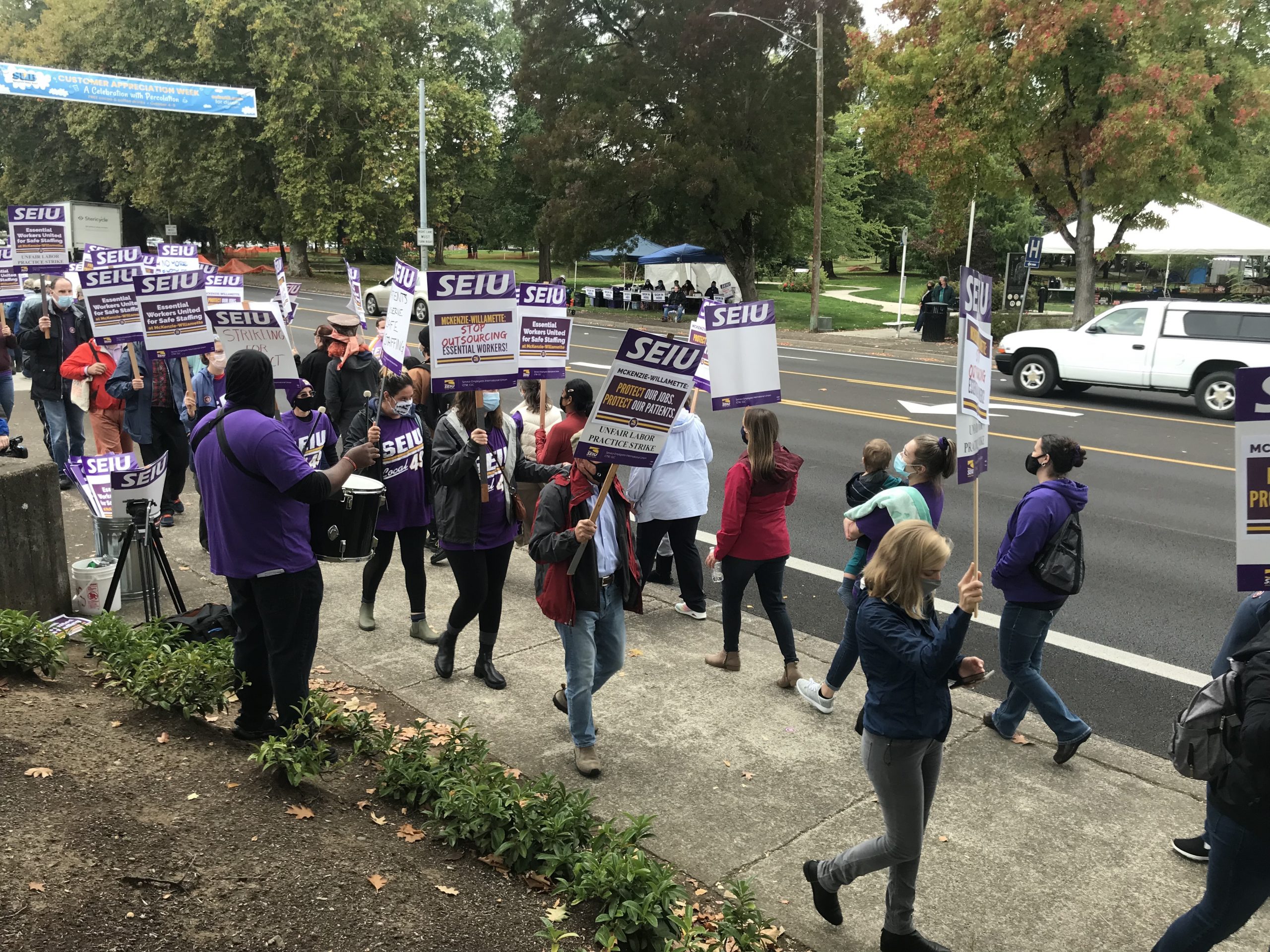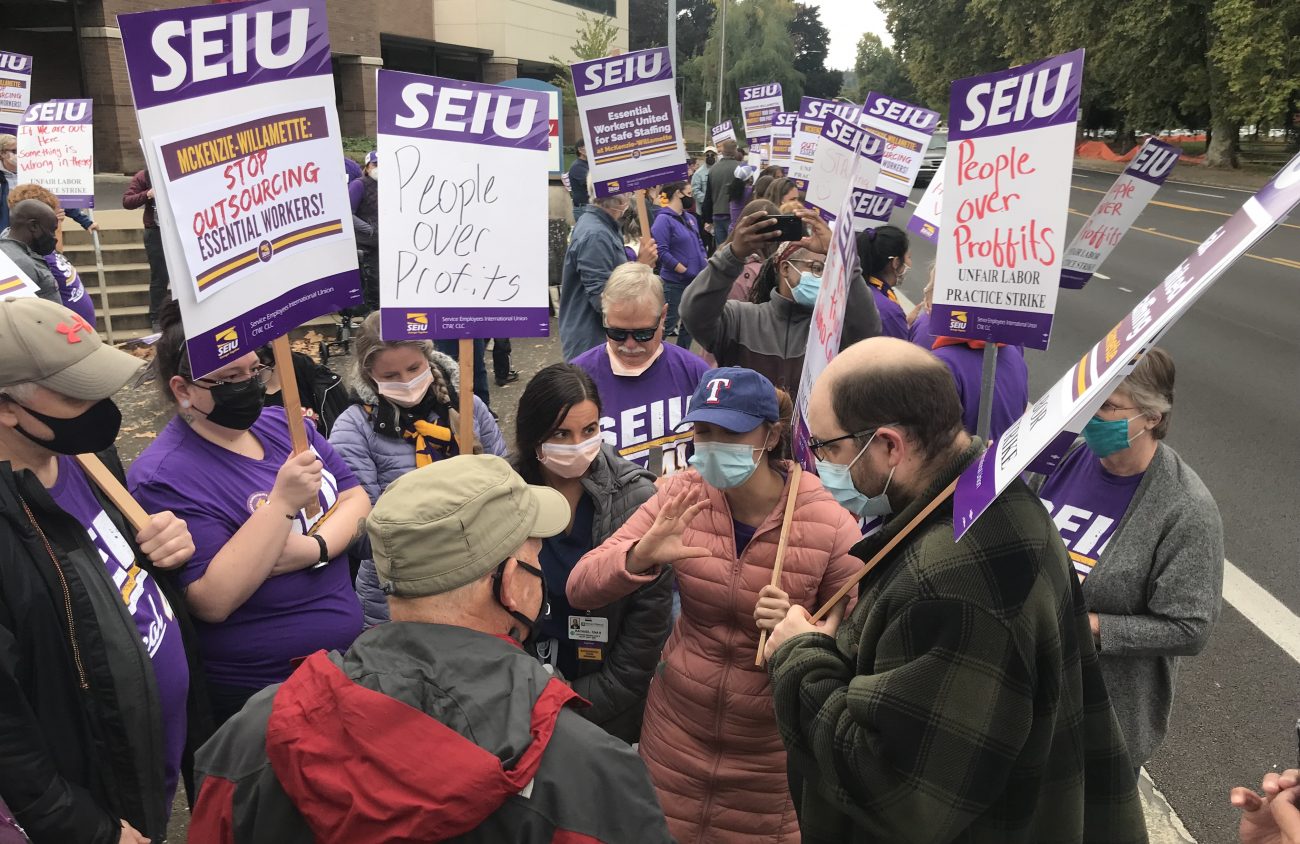About 80 hospital workers and supporters are standing outside McKenzie-Willamette Medical Center in Springfield, waving signs announcing an unfair labor practice strike. As drivers pass by on 14th Street, many honk their horns in support.
Four hundred workers represented by the SEIU Local 49 are without a contract with the Springfield hospital. The union and workers say the hospital management isn’t bargaining fairly and wants to raise health care prices while not providing a livable wage and COVID-19 protection — as well as outsource some of its staff.
On the strike’s first day, Oct. 5, Congressman Peter DeFazio visited in support of the workers. He said the hospital’s management is a trend of today’s economy and that it’s time to review monopoly laws so for-profit groups aren’t purchasing hospitals like McKenzie-Willamette and cutting wages and benefits.
“I remember when this was a great community hospital,” DeFazio told the picketing crowd, adding that the management has changed over the years as different corporations have taken it over. The majority owner of McKenzie-Willamette is the publicly traded Tennessee corporation Quorum Hospital Corp.
The contract between the hospital and SEIU workers ended in August. SEIU represents housekeepers, certified nursing assistants, MRI technicians, respiratory therapists, pharmacy technicians and more.
According to a press release from SEIU, workers are on strike because they feel understaffed and are experiencing a high turnover rate, as well as a lack of affordable health care and COVID-19 protections. Despite receiving $4.5 million in CARES act funds the hospital has ignored worker demands for competitive wages or hazard pay, the release says.
“This is a trend in America — and it’s a sick trend. It’s a trend where Wall Street is taking over services that are critical, absolutely critical, to the American people and trying to bleed out every bit of profit they can get out,” DeFazio told workers and supporters.
The strike began 4 am Tuesday, Oct. 5, and runs through Oct. 7. The hospital is still open. The strike received support from Teamsters, the local Roofers Union and the University of Oregon’s GTFF graduate employee union, as well as Lane County Commissioner Laurie Trieger, Springfield City Councilor Leonard Stoehr, state Sen. James Manning, Eugene City Councilor Matt Keating and Oregon Bureau of Labor and Industries Commissioner Val Hoyle.
Before speaking with the crowd, DeFazio said he talked with the union’s bargaining team. He said they told him some entry-level positions at the hospital pay less than at Target. Paying workers low wages is a part of the corporate model that is common with hospitals today, he added.
“They cut back on the number of nurses on the floor, cut back on what you’re going to do with the maintenance of the building, all the short-sided things they do so they can show a higher profit on Wall Street,” he told the picketers. “The stock goes up a little, the CEOs get bonuses, and they go home to their multimillion-dollar mansions.”
An official with SEIU tells Eugene Weekly that some entry positions at McKenzie-Willamette start as low as $13 an hour.
“This is a huge growing problem with inequity in this country, the people who do the work, who make this country move are being disrespected. You’re being disrespected,” DeFazio said.

Housekeeper Gypsy Smith is one of the housekeepers whose jobs could be outsourced to a Texas staffing agency. Speaking to the crowd, she called the hospital’s treatment of workers “modern day slavery.”
Nicole Pepple, a critical care unit monitor technician, tells EW that she’s been at McKenzie-Willamette for 10 years. During that time, she says she’s seen McKenzie-Willamette often pay less in wages than what workers earn at PeaceHealth hospitals.
“As an employee, we’ve been begging for respect,” she adds.
Briana Wamsley, who works in the respiratory care program, says she wants respect from her employer, too. During the pandemic, she says she’s seen more patients die from COVID-19 than anything else in her 13-year career at the hospital.
McKenzie-Willamette management is trying to increase health care costs for employees by 27 percent. In the long run, Pepple says, it makes health care unaffordable and sends most of their paychecks to insurance premiums, which isn’t what it once was. Years ago, the hospital’s health insurance felt “upper-middle” class, allowing easy medical access in the area.
Increasing health care costs on hospital workers at McKenzie-Willamette means they’ll have to try to get on Oregon Health Plan, DeFazio tells EW. “Those aren’t great plans,” he adds. “That’s ironic. For the people who work in health care, risk their lives every day during COVID, that they’re going to have substandard health care plans that are more expensive.”
McKenzie-Willamette management’s bargaining efforts are a trend of today’s economy, DeFazio tells EW, where the “sharks of Wall Street” are trying to squeeze a penny out of everything. To counter this trend, he says that Congress needs to pass the PRO Act, which would make it easier for workers to unionize, but also address the increased presence of industry monopolies.
“We need to look at antitrust as it comes to private corporations buying hospitals,” DeFazio says. In July, President Joe Biden signed an executive order that is assessing industries where corporations have consolidated monopolistic power and the impact it has on consumers. DeFazio says the Biden administration should put corporations that are buying hospitals at the top of the list of antitrust enforcement.
“There are mega-corporations that have taken over health care — and they’re buying up doctor’s practices now,” he says.
This story is a part of Eugene Weekly’s reporting series on the labor movement in Oregon, funded by the Wayne L. Morse Center for Law and Politics.
